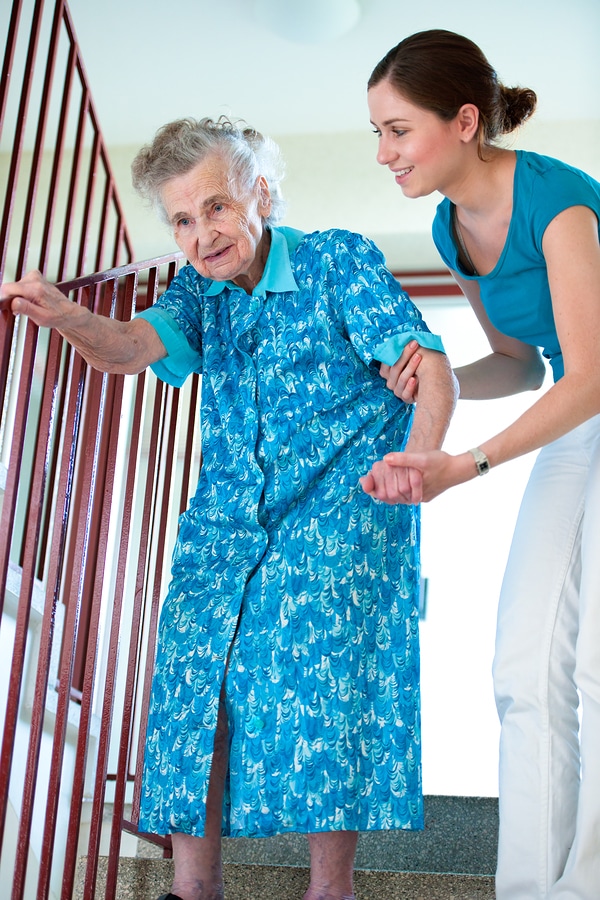As people age, their physical abilities change. Even for somebody who exercises regularly and takes good care of their physical body, there will come a time when the most basic tasks that were once easy become more challenging. Senior home care is a great asset, but not everyone is ready for it—even when they are truly “ready” for it.
Many times, elderly men and women don’t realize that their safety is compromised. Sure, most of us readily understand that if we don’t have the same strength in our legs that we did last year, we may not be able to go up and down the stairs as quickly, confidently, and assuredly as we once did.
Does that mean we are going to fall? Does that mean we are at a real risk of stumbling down the steps and being seriously hurt? No. Nor does it mean an elderly person has reached a point in their life where it is only a matter of time before they trip and fall and are seriously injured, or worse.
But that also doesn’t mean you can’t take safety seriously, for yourself or anyone else, and get help for an aging loved one with senior home care. Most of us have no idea of the vast number of risks that surround us each and every day. We are simply unaware of all the dangers we overlook because they’ve never impacted us before, at least not since we were young children still learning to walk and run without toppling over.
Several modifications can be made to a home to improve safety, especially for someone in their advancing years.
Installing grab bars.
Did you know that the bathroom and kitchen are the most dangerous rooms in each home? In the kitchen, you have to worry about the stove, dull knives, and items high up in the cabinets, but what about the bathroom?
When you step in and out of the tub or shower, when you are young, strong, and healthy, do you ever think about hazards when you slip, even just a little bit? Probably not. That’s because you are quicker, more agile, and have more strength underneath you. You can keep yourself from falling over; it happens plenty of times, but you don’t remember those events.
Grab bars installed in the tub or shower surround or even around the toilet can help an aging person with weaker legs confidently step into and out of the shower and tub. They’ll have something to hold onto, something firm, something that can help them maintain their balance. It is a simple installation, and some use suction and are strong enough to hold the weight of a full-grown, healthy adult.
Bringing items in the kitchen down within reach.
Instead of an aging person having to get on a stepladder or even the kitchen chair to reach spices, soup cans, or something else from the higher cabinets, empty those out and bring them down to within reach. Having all those items on the counter may not look great, but it’s a lot safer.
Get rid of old rugs.
Yes, that rug may have great sentimental value. It may have been an heirloom. Whatever the case may be, you don’t necessarily have to get rid of it, to throw it out, but roll it up and put it away somewhere.
Why?
Well, if it is old, it may be flimsy. Edges may get turned up, and the corner may be warped. These are all potential tripping hazards, and they are essentially unnecessary risks.
Talk about bed rails.
If the senior doesn’t have any trouble sleeping at night and doesn’t toss and turn, then bed rails don’t seem to make sense. But if they have trouble getting out of bed without senior home care assistance, wouldn’t it make sense to have something there they can hold onto for safety?
These are just a few simple modifications an aging senior might consider making to improve safety for themselves at home along with contacting a senior home care agency to help.
If you or an aging loved one are considering Senior Home Care in Charlotte, NC, please contact the caring staff at Affordable Family Care.
Serving Raleigh, Greensboro, and the surrounding areas in North Carolina. Call today at (919) 676-1070
- Does Your Mom or Dad Need 24-Hour Home Care? - March 27, 2025
- Why Sun Protection Is So Important For Seniors - March 7, 2025
- Choking Risks With Alzheimer’s Disease - February 25, 2025







